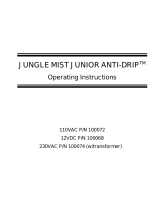
LED Mirror Power Source FAQ
110VAC
Anti-fog
pad
OutputInput
Power Source:
Constant 110AC
power
Output
12V on/o
Dimmer Switch
12V LED Light
110VAC -12VDC
LED
driver
Internal Power Flow Diagram
110VAC
Anti-fog
pad
OutputInput
Power Source:
Ceiling/Vanity
Light controlled by
a non-dimmable
swithc On/O
switch on the
wall.
Output
12V on/o
Dimmer Switch
12V LED Light
110VAC -12VDC
LED
driver
110VAC
Anti-fog
pad
OutputInput
Power Source:
Ceiling/Vanity
Light controlled
by a non-
dimmable
swithc On/
O switch on
the wall.
Output
Bypass built-in
touch dimmer switch
12V LED Light
110VAC -12VDC
LED
driver
110VAC
Anti-fog
pad
OutputInput
Power Source:
Ceiling/Vanity
Light controlled
by a dimmable
swithc On/
O switch on
the wall.
Output
12V on/o
Dimmer Switch
12V LED Light
110VAC -12VDC
LED
driver
Scenario 1
(Direct Wired)
This is the most common way to
connect the mirror. The LED light
& anti fog pad are both
controlled by the built-in touch
switch on the mirror.
*The LED light is dimmable.
Scenario 2
(Wall Switch)
By doing so, the mirror is now
bridged to the wall switch. In order
to turn on the mirror,the wall
switch needs to be on. The touch
switch can be used to turn on the
LED mirror and anti-fog pad. The
mirror shuts down once the wall
switch is flipped to OFF.
Scenario 3
(Wall Switch – No Dimmer)
By doing so, the mirror’s light and
anti-fog pad are now controlled by
the wall switch. This is without the
need to use the built-in touch
switch. The touch switch is disabled.
The LED and anti fog pad are now
controlled only by the wall switch.
Scenario 4
(Wall Dimmer Switch –
Not Accepted)
This is a scenario that is not
acceptable. There is no work
around for our mirror.
Do not try this way as it will
damage the LED driver.

